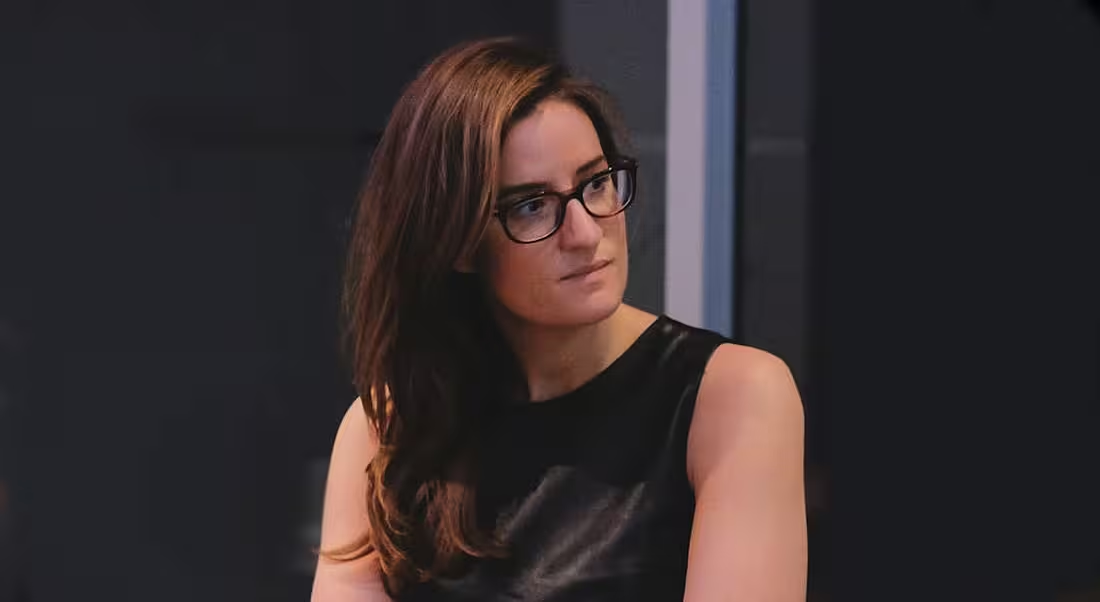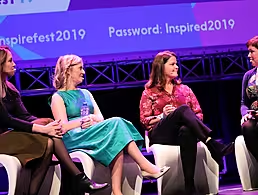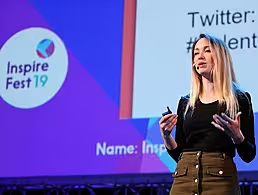From creative arts to fintech solutions, Bank of Ireland’s Lesley Tully has seen the whole world of design thinking take shape.
In 2014, Lesley Tully, armed with years of experience running and designing major art events, met David Tighe, head of innovation at Bank of Ireland (BOI).
Tighe had been tasked with bringing BOI up to speed, with financial innovations fast becoming the primary focus of established banks all over the world.
Extreme competition
Apps, new ways to lend, new ways to save, investing tools, mortgage applications, and everything in between, were services that established banks were facing extreme competition in, and not just from each other.
Now, start-ups were emerging by the day, with tools so focused and tailored that very few niches remained untouched.
Tully was brought into the fold and, pretty soon, was tasked with helping BOI re-engage with customers, and appeal to non-customers.
“What I’m focused on is to tip off BOI on where our customers’ problems are,” she told Siliconrepublic.com. “Start-ups are able to double-down and find a single customer problem. We are trying to bring that into the bank.”
Banks like BOI have to battle through immense legacy restrictions, trying to stay relevant in a world that is becoming smaller and smaller – now just the size of a smartphone for many.
“At large companies like BOI, ones that have been around for ages, the focus begins to turn to cost-cutting, efficiency, pension deficits, staff etc.
“They get far removed from the customer. Start-ups are exceptionally close. They can talk to customers that day, in constant communication through digital.”
Image: Myimagine/Shutterstock
Long path
Tully and Tighe have brought BOI’s Workbench on Grand Canal Dock to life, just for that purpose: connecting with customers in the moment and, when that doesn’t work, connecting with start-ups that can do it better.
This, according to Tully, is what design thinking is. It’s not glitz, or glamour. “It’s human-centred design. The simple byline is ‘solving customers’ problems’. That’s what it is.”
Tully holds a bachelor’s degree in design and a master’s degree in entrepreneurship from Trinity College Dublin and Goldsmiths, London, respectively. A board member of the National Gallery of Ireland, it’s fair to say financial services was not an obvious entry on her career path at the turn of the millennium.
Entering the world of creative arts, Tully – who will speak at Inspirefest 2017 – enjoyed a bit of luck to get her first major gig, landing work on a Brenda Fricker film.
A notoriously difficult industry to forge a career in, Tully saw that, when working in film in Ireland, you’re constantly banking on a big production to come to town.
“Yeah, you have no experience, you’re trying to gain experience … it’s a world of pain.”
Creative arts, though is a “different world”, given the money swirling around, and the endless blank canvasses on which to work.
A design for life
Noticing that the commercial world paid better, Tully began looking at art, soon running an art fair that saw nine months of planning, galleries from all over the world setting up shop in one place, and people spending millions on single paintings.
It was here that she got her first taste of dealing with start-ups, with the aim of targeting the right galleries, big or small, and getting them to come to an event – a challenge that stands her to this day. “You’re always on the lookout for emerging talent,” she said.
But, despite the rise in art fairs being “really, really interesting,” Tully eventually needed to find a way out.
“You could be working on the VOLTA art fair in Basel, where they would be doing sales of $500m, with celebrities like Brad Pitt, Elton John or Mark Jacobs,” she said.
And yet, in spite of the A-list ingredients, the industry was too formulaic.
“For all of the creativity, it’s quite uncreative as a business model,” she said.
Working as a design consultant for a few years brought her further from the arts, and closer to the rest of the world and her meeting with Tighe.
On a journey
“He asked if I wanted to come on the journey,” said Tully, which is one that’s now three years old and still going strong. Though it’s far from easy.
With start-ups snipping away business at one end, and rival banks putting pressure on BOI at the other, Tully’s constantly having to establish what customers want and, just as difficult, how to give it to them.
Referring to herself and her team as “obsessed with UX and UI”, Tully still has to operate within the confines of a major bank, though there are clear benefits behind its pulling power.
“One of the biggest challenges is that the systems are so old,” she said, some going back decades. Back-end processes, or platforms on the website, for example.
“One challenge is our major tech transformation challenge, which will revolutionise our app and our website. But it takes time; this is sensitive data.”
Tully’s team has poured money into Workbench, first in Dublin, then Galway, Limerick and Cork. These are the staging posts BOI is using for its assault on the coming decades.
“This is how we can focus on micro-moments,” she said, “making sure the customer journey is satisfied.”
From left: Charles Dowd, Plynk; Lesley Tully, Bank of Ireland; and Clive Foley, Plynk. Image: Naoise Culhane
Start-ups to come through Workbench include Plynk and Deposify, the two greatest successes to emerge from there since its 2015 creation.
Plynk – a tool to allow users to send money via messages – recently raised €25m. This was one of the most successful opening funding rounds in Irish history.
Deposify – a start-up that handles rental deposits on behalf of both tenants and landlords –enjoyed its own funding success last year.
“Start-ups like Plynk are cutting across the whole industry,” said Tully. These are the ideas she looks for, and it is their tools which change the customers’ experience.
Design thinking might sound “a little faddish”, she said, but Tully likes the term because it says what it does.
“It’s human-centred design, it’s solving customers’ problems. That’s what it is.”
Lesley Tully, head of design thinking at Bank of Ireland. Image: Paul Condron (@CondronPhoto)
Inspirefest is Silicon Republic’s international event connecting sci-tech professionals passionate about the future of STEM. Book now to join us from 6 to 8 July in Dublin.




